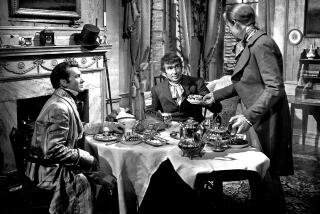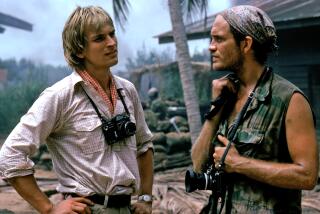His epic career
The late British director David Lean was a consummate filmmaker who had the uncanny artistic ability to transform epics into intimate character studies, as illustrated by his Oscar-winning “The Bridge on the River Kwai” and “Lawrence of Arabia,” as well as “Doctor Zhivago” and “A Passage to India.”
Beginning today, the American Cinematheque at the Egyptian Theatre presents “These Mad Places: The Epic Cinema of David Lean.” In addition to the films above, the first major L.A. Lean retrospective will feature pre-epic work such as “Brief Encounter” and “Blithe Spirit,” among others.
Born to a strict Quaker family in the London suburb of Croydon in 1908, Lean became interested in photography and at the age of 19 became a gofer-wardrobe assistant at a movie studio. By the late 1930s, he was one of British cinema’s most respected editors, and in 1942, when writer-actor Noel Coward asked him to co-direct “In Which We Serve,” Lean’s directorial career was born.
Lean, who died in 1991, never let his visuals overshadow his actors. Alec Guinness, John Mills, and Dame Peggy Ashcroft won Oscars in films he directed. Lean also made stars of Peter O’Toole and Omar Sharif with “Lawrence of Arabia.”
Several admirers and colleagues recently assembled to discuss Lean: Dennis Bartok, head of programming for the Cinematheque; Rick Jewell, associate dean of the USC School of Cinema-Television; director Guy Green, a lifelong friend who worked as a camera operator and cinematographer on many of Lean’s early films; and Anne V. Coates, editor of “Lawrence,” who also worked with Lean on the 1989 reconstruction of the film.
*
The power of Lean
Dennis Bartok: Very few directors in the history of cinema knew film as well as Lean did, and I think it shows. People think of “Lawrence of Arabia” as an incredibly epic film, but the way he constructed it, it’s so detailed. That famous telephoto shot of Omar Sharif approaching Peter O’Toole and his guide at the well -- you see him coming out of the haze in the distance, and it’s this amazing series of shots as he comes closer and closer. One of the things that Lean did with his art department to accentuate how we see him is that they painted white lines in the desert that would focus our eyes on the approaching rider. We don’t see them, but they are out there. It’s that sort of attention to detail, the way he’s thinking creatively. I think he had an unbelievable sense of drama in all of his films.
Rick Jewell: I always loved his work, from the time I saw “Bridge on the River Kwai” when I was a kid. That was the film that just made me aware of what a great filmmaker was. The kinds of films that are made today, to me, most of them are just hollow, whereas his films have fascinating characters right in the center of them that anchor you to the spectacle.
He would take things like “Kwai” and “Zhivago” and he would turn out films that were better than the literary source it was based on. You can’t say that about most directors.
*
Memories
Guy Green: At the time [we met] I had been working for 10 years on films, most of them not of any great importance, and they had become a little bit dreary. And suddenly, I met this man who inspired everybody that worked with him. He had the knack of making them think that their work was terribly important, and he got the best out of everybody.
*
Collaborations
Anne Coates: He had been an editor, so that was really nerve-racking for me. I was terrified. I was fairly young then and had cut a couple of quite good movies, but nevertheless, he was the doyen of editing. He actually loved the cutting room. He was a different person when he was in the cutting room. He was much more relaxed, more fun really.
I think one of the things he said to me, which I always treasured from when we did the reconstruction, was “I forgot what fun we had in the cutting room,” and that was true. He taught me to have courage in my cutting and to come up with ideas and never be afraid. He taught me to hold the shots a lot longer than I would have dared.
Green: He didn’t do any storyboards but he worked on the script a great deal, and the wonderful thing with him, John Ford and Hitchcock is that he knew what he wanted and that’s what we shot. We didn’t shoot much more.... I think directors today are overwhelmed by technique and they shoot a great deal of film, and a lot of it is made in the cutting room, which is not a good place to make a film.
*
The man
Bartok: The films that he did commit himself to he did wholeheartedly and in many cases took years of his life. He had a very complicated personal life. I think that he poured his emotions and his creative energies into his work. He was married a number of times. He was a tax exile many years from England. He lived in the South Pacific for many years. He lived in India. He was kind of a restless soul in many ways.... I think in some ways he kept up a wall around himself that probably allowed him to focus on his creative work.
*
Favorite films
Green: I would say “River Kwai” was probably the film that has affected me the most. I didn’t work on it, but I was overwhelmed by it.
Bartok: My hands-down favorite would be “Doctor Zhivago,” because it is so gloriously romantic. In a way I love it as a kind of companion piece to “Lawrence of Arabia,” where there are no female characters except for a few long shots of Bedouin women. The film is all male. “Zhivago,” in a way, is the polar opposite. It’s a film that is so beautifully, gloriously romantic. Omar Sharif’s performance is almost more feminine than either Julie Christie or Geraldine Chaplin’s. His amazing eyes -- he’s so unbelievably sensitive and the hurt and pain of everything that has gone in the world is reflected in his eyes.
*
Legacy
Bartok: “Lawrence of Arabia” has come to be the bar by which all epics are measured when you see a film like “The English Patient” or “Braveheart” or “Empire of the Sun.” There are so many films that you see today that kind of aspire to the sweeping grandeur and incredible human drama that Lean was able to combine.
Jewell: I think certainly Kubrick must have been tremendously influenced ... Coppola, Spielberg, people like that. The young filmmakers today ... they are not interested in ... classical storytelling that much and they are not interested particularly in the kind of ambiguous, nuanced characters that excited him. Like “Lawrence” -- for such a huge canvas type of film it is one of the great character studies in the history of movies.
*
‘These Mad Places: The Epic Cinema of David Lean’
Where: American Cinematheque at the Egyptian Theatre, 6712 Hollywood Blvd., Hollywood
When: Today-Sun. at 7:30 p.m.: “Lawrence of Arabia”
Monday at 5 p.m.: “Brief Encounter”
Oct. 12 at 4 p.m. “Great Expectations”
Oct. 16 at 7:30 p.m.: “In Which We Serve” and “This Happy Breed”
Oct. 17 at 7:30 p.m. and Oct. 18 at 4 p.m.: “Doctor Zhivago”
Oct. 19 at 5 p.m.: “Madeleine” and “Hobson’s Choice”
Oct. 30 at 7:30 p.m.: “Summertime” and “The Passionate Friends”
Oct. 31 at 7:30 p.m.: “The Bridge on the River Kwai”
Nov. 1 at 5 p.m.: “Oliver Twist”; at 8 p.m., “Ryan’s Daughter”
Nov. 2 at 4 p.m.: “Blithe Spirit”; at 6:45 p.m. “A Passage to India”
Price: $9 general; $6 Cinematheque members; $8 seniors (65 and older) and students with valid I.D. card.
Contact: (323) 466-FILM or www.egyptiantheatre.com
More to Read
Only good movies
Get the Indie Focus newsletter, Mark Olsen's weekly guide to the world of cinema.
You may occasionally receive promotional content from the Los Angeles Times.











